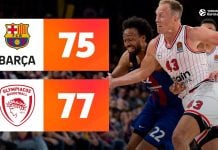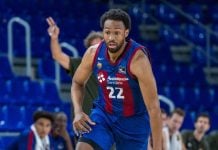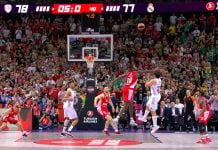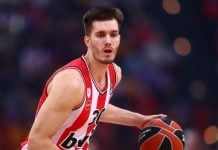 Trying to figure out what will the focal point of this Final Four would be in order to start this preview with a more attractive opening paragraph. Read a detailed preview of the four finalist by one of our reporters in London.
Trying to figure out what will the focal point of this Final Four would be in order to start this preview with a more attractive opening paragraph. Read a detailed preview of the four finalist by one of our reporters in London.
I spent a long time without any success. After all, Euroleague Final Four weekends have always been attractive and interesting; no matter where they were taking place or which teams were participating. The above statement doesn’t get any further upgrade, once this Final Four, though taking place this year in the easiest to reach destination of the world and has been the major place of interest for the Euroleague to invest time and money for many years now in order to prove that they actually brought something to the sport of basketball, has been unable to sell out, according to sources.
The three of the four participants (Barcelona, Real Madrid and CSKA Moscow) have been more or less expected here being the main three pre-season favourites and the Cinderella of this year is last year’s champions Olympiacos.
However, the bright spot of this Final Four is no other than its balance. This is going to be one of the most open events of recent memory, mainly because, all season long, there hasn’t been a team that was steady enough to be considered as arguably the favourite to win it all. As a matter of fact, every single team this year has had weak moments that allow us to presume that there is no real team-to-beat in the London Final Four. If this makes a solid reason for our UK readers to buy some of the cheap tickets that are now being sold online, then we might see some more spectators following this exciting event.
In the early semi-final, we get the hors d’oeuvre of the competition. Last season’s epic final game will be repeated, or at least we hope so. Defending champs Olympiacos will be facing CSKA Moscow, in a game where both teams will be both similar and different to their last May classic. On the one side, the young Greek team, now coached by Giorgios Bartzokas instead of Serbian legend Dusan Ivkovic, will be appearing with a very similar roster to last year (apart from banger Joey Dorsey having been kicked out months ago, substituted by more offence-oriented Josh Powell).
While Powell has been rather effective and his presence on the court has helped Olympiacos reach the Final Four more than most would suspect (he’s a part of the two most efficient lineups for the reds), the real strength of Olympiacos’ success to repeat as a top four European team doesn’t come from the frontcourt.
True, the presence of key veterans Kyle Hines, Giorgios Printezis and Pero Antic, as long as Giorgi Shermadini is important, but it’s not where the truth lies. The starting backcourt of Acie Law, Vassilis Spanoulis and Kostas Papanikolaou has been so immense for them that whenever they are on the floor, usually Olympiacos wins. Law’s importance has been immense in the top8 stage; Spanoulis is a worthy All-Euroleague 1st team selection as an off-guard; and Papanikolaou, this year’s best U22 player has been spectacular in both ends of the floor, also being one of Europe’s better spot shooters nowadays.
The trio is being subbed by Kostas Sloukas, Marty Gecevicius and veteran Stratos Perperoglou, with the latter having a downfall from his years in Panathinaikos. They will miss PG Vangelis Mantzaris who is out for season, but had was very fluid in both ends on the floor whenever he was asked.
What has Bartzokas managed in this season? His fame had preceded him mainly because of his success with smaller-budget teams (Maroussi, Panionios), so the bar had originally been set high for the young coach. However, despite an early setback and some weak links (call me Dorsey) and some lack of character (especially early in the Top 16 stage), Olympiacos managed to seal the deal by grabbing the 2nd Group E spot in the second stage, which allowed him to go through with a Top 8 home-court advantage against the lately overachieving Anadolu Efes who were a good team. One could call them slightly better than Olympiacos, but this is debatable. Once they didn’t secure the home-court, the Turks managed a surprise comeback in Istanbul in an epic game four, but then the Reds replied with their own comeback in game five to book their London ticket.
This was the point that this team had shown character. In the last game of the pre-Final Four season. And had much climbed from their former instabilities under a new coach, mainly taking advantage of some Maccabi Tel Aviv and Caja Laboral Top 16 setbacks, which allowed them to hold the home-court advantage in the Top8. Add to that the experience that this team has gathered over the past season, despite the pressure of being the champions and you have a much changed team, not roster-wise, but mainly on the game’s tempo (they focus less on defence but they still can win) and you got the weakest link of the Final Four, however a link that had already been there as the Cinderella last season and ended up winning it all.
{youtube}EDfqITOcOtc{/youtube}
Against CSKA Moscow, though, this might not be enough. The Russians might have lost the championship last year in one of the biggest shockers world basketball has ever witnessed and they are not so good as they were last year, but at least they look more of a team right now.
The main reason for that is that they have a better coach. Ettore Messina, for one reason, is great to control stars and create enough discipline in order for his usually very skilled players to both feel free enough to create but also respect the rules of a team. Lithuanian Jonas Kazlauskas, last year’s coach, didn’t seem to care much about discipline and he ended up allowing star guard Milos Teodosic losing the game for his team at the end.
Of course, Teodosic, a former Euroleague MVP, is not a disaster of a player; rather the opposite, most would say. The very talented Serb, one of the world’s elite and purest point guards is now back on track, after a so-and-so regular season and had been the competition’s steadiest playmaker since the beginning of the Top 16. In a backcourt that also includes the very up-and-coming Vladimir Micov, the very productive and now healthy again Sonny Weems, the skilled Aaron Jackson, the resurrected Theo Papaloukas and the underachieving Anton Ponkrashov, Teodosic has been immense for the Russian team, being a member of the five most productive lineups that CSKA used this year. Euroleague rewarded him with a place in the 2nd All-Euroleague team for that, saving the PG place in the 1st team for Panathinaikos’ Dimitris Diamantidis, also a former MVP, who though had his second worst Euroleague season after nine years in the competition. Weird things these awards, most would say.
Looking for the most important player of the team, it might be Teodosic or maybe Victor Khryapa, the do-it-all forward, who also enjoyed an epic season. Without him, on paper or not, it would have seemed rather rough for CSKA to even make it in the Final Four. Especially in a Top 8 series against Caja Laboral, where they suffered several collapses, before edging the Basques at the end of a fourth game characterized mostly by a bunch of questionable calls, which favoured the Moscow side to avoid a game five.
Khryapa, another surprise omission from the 1st All-Euroleague team (and some of today’s expert’s pick for the MVP award), has been filling the statsheet like no-one else at this level, but he might be less important than Teodosic after all, given the frontcourt CSKA has. Take aside the team’s sole 1st All-Euroleague selection Nenad Krstic, who has appeared to play both frontcourt positions with the same effectiveness and a very solid Sasha Kaun, the team is now at full strength with the returns of Zoran Erceg and Andrey Vorontsevich to get the competition’s arguably deepest and better working frontline.
On paper, Olympiacos will never beat CSKA without an overachieving performance by Law and especially the fine scorer Spanoulis and in parallel a mediocre game from Teodosic, Micov and Weems. The backcourt seems more balanced and Olympiacos’ players might edge the game then rather than in the paint.
On the other side, using a bigger guard on Spanoulis has worked in the past and Micov or Weems might be just what the Russians will end up doing if the game doesn’t work for them from the start. The last thing they want is to be kicked out again and by the same team.
El Clasico: the main event, perhaps?
The main menu of the semis, of course, couldn’t be including anything else but what could be the “game of the year” in Euroleague. El Clasico, as it is called, has been so far repeated three times, two for Liga Endesa and once for the Copa del Rey in Spain. Barcelona won the first two games (both classics, both close, both brilliant) while Madrid had an easy win in the last, yet it was without Barca’s superstar Juan Carlos Navarro.
There are plenty of reasons for European hoops’ fans to await this match-up. First of all, the two teams had a different path this year. Madrid was immense and stormy early in Spain, yet moody in the Euroleague Regular Season, while Barcelona came a game away from missing the Copa del Rey while they were the Regular Season’s best team in the Euroleague.
In the Top 16, when they lost one of their best players in Pete Mickael (had a great season for his 35 years) and with Navarro battling injuries all season long, the Catalans dominated their group while they returned to form at Liga Endesa as well. Madrid dropped a few games in the local league and finished second in their Top 16 group, but swept Maccabi Tel Aviv in fashion in the Top 8. Barca, on the other hand, needed 5 very solid games from Ante Tomic and some big buckets from Navarro, to get rid of the dodgy company of Panathinaikos in order to qualify for the Final Four.
So, both paths seem topsy-turvy, yet here they are.
With two coaches who represent difficult schools of basketball (Madrid’s Pablo Laso has been maybe too open-minded offence-wise, while Barca’s Xavi Pascual had played some of the most annoyingly disciplined ball in Europe during the past two seasons, not really leaving much space for self-confidence to his point guards), but both seemingly flexible over this season, things couldn’t be much predictable on this semi and that’s why it looks very promising.
Sergio Rodriguez and Sergio Llull, two up-tempo guards with fine court-vision and scoring abilities, lead Madrid’s backcourt. Dontaye Draper has had limited playing time this year, while Jaycee Carroll and especially the All-Euroleague 1st team worthy pick Rudy Fernandez have both had outstanding seasons. With Carlos Suarez starting at SF, Rudy usually plays the 2-guard position until the former is subbed to allow Laso to run a higher pace tempo. Usually it takes both Rudy and Carroll at the same lineup to get the best possible outcome and outscore an opponent, while either S-Rod or Llull can run the point.
{youtube}QKCYeU_iUjM{/youtube}
Against that rather successful and plentiful lineup, Barca has found solutions this year and they might be able to adjust just fine. While Navarro was absent in some spans of the season and Mickael is out of the picture now, Pasqual had the privilege of either switching to shorter lineups or using apart from useful Aussie forward Joe Ingles, the young sensation Alex Abrines, who had been one of the best rookies of the season, with the unreal 61.3% TS%.
Victor Sada, often exposed against Panathinaikos offensively, has not been that bad over the season backing up Marcelinho Huertas. Huertas’ case has been the real change of Pascual’s philosophy; now allowing him more freedom (often because of Navarro’s absence, so the coach is not fully excused here.) and the Brazilian PG has finally shown glimpses of his true potential. The role of Saras Jasikevicius has looked like the one he had when in Panathinaikos. He might be even more useful at this stage, in limited minutes though. However, with small ball having been successful in latter parts of the season for Barca, he might be used again alongside Huertas and Navarro.
With the backcourt possibly going either way, would the frontcourt be open enough as well? Madrid will expect big games from Nikola Mirotic and Felipe Reyes, two powerful PFs who cover for each other and can also play together. All their centers, though are complimenting the power forwards. Offensively limited banger Marcus Slaughter, skilled Slovenian Mirza Begic and rookie Rafa Hettsheimeier might not be as productive as Barca’s scoring centers and they are certainly not equally important for their team in terms of scoring.
While Mirotic (a 2nd All-Euroleague pick at age 22) and especially Reyes were very steady both in average and per min, there might be a small gap at center that could allow the soft touch Tomic (Europe’s top center right now and one of the best in the world; a worthy All-Euroleague 1st Team selection) or even Nathan Jawai take advantage of it and find the bright spot that could edge the game on the Blaugrana side.
In order for this to happen, of course, it would require Erazem Lorbek to forget his series showing against Panathinaikos and revive its old game, when he used to be Europe’s top power forward. He will get some off the bench help by CJ Wallace, but holding Mirotic and Reyes is no easy thing to do, even if this will be the first Final Four game ever for the young Montenegrin.
As this should be an exciting, but also very detailed game, there might be no other obvious spots to scrutinize. However, it is the definition of a 50-50 matchup and we will be more than glad to enjoy it.
Statistics taken from the amazing In-The-Game.org website
Dimitris Ritsonis, from London

















